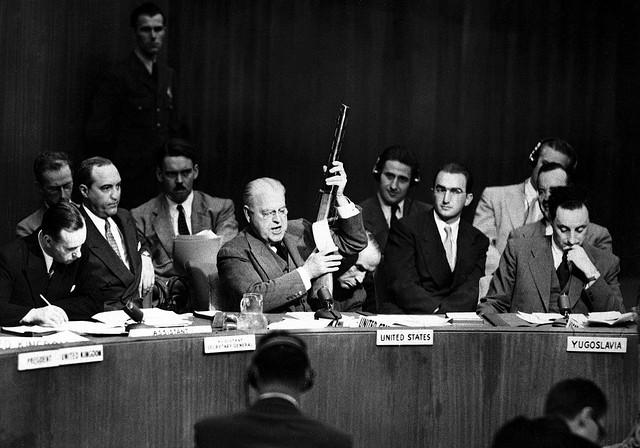 North Korea’s most recent nuclear test has provoked some extraordinary reactions from media commentators in the past few weeks, some of which suggest a somewhat one-dimensional view of the nature of nuclear decision-making and the role of UN sanctions and a flawed understanding of the goals of US non-proliferation policy. Setting the record straight is an important task, because it has implications for the nuclear non-proliferation regime and for international security more generally.
North Korea’s most recent nuclear test has provoked some extraordinary reactions from media commentators in the past few weeks, some of which suggest a somewhat one-dimensional view of the nature of nuclear decision-making and the role of UN sanctions and a flawed understanding of the goals of US non-proliferation policy. Setting the record straight is an important task, because it has implications for the nuclear non-proliferation regime and for international security more generally.
Let’s start by setting out a couple of points that are hard to deny. First, the test—Pyongyang’s third and most successful—has reinforced the fact that international efforts to prevent North Korea developing and retaining a nuclear weapons capability have so far failed. This is widely recognised and is deeply troubling. Second, the test showed that many analysts and policymakers have underestimated the regime’s determination to maintain a nuclear deterrent (PDF). The contention that successive North Korean leaders have been pursuing nuclear weapons purely as a bargaining chip, to be relinquished when the price is right, looks weaker today than ever before. This is equally disturbing, as it reduces the leverage of international negotiators who still hope that North Korea can be peacefully disarmed.
For sure, it’s a bleak picture but in their commentary, some influential voices seem to be succumbing to nuclear defeatism. Hugh White, for example, recently asserted in The Age that ‘nothing short of a full scale invasion’ can persuade Pyongyang to give up its nuclear weapons program. This might be overstated for the sake of eye-catching journalism, but contrary to his argument, nuclear decision-making isn’t a linear process and doesn’t follow a pre-determined path. Nuclear policy is affected by domestic and international events and by ideas.
In the past states—including Australia—have voluntarily relinquished their nuclear ambitions at an early stage in the proliferation process, while others have divested themselves of advanced nuclear weapons programmes, including actual nuclear arsenals. This isn’t to argue that convincing North Korea to follow this path is easy or even possible in the short-term (Hugh White and others are no doubt right about that), but to acknowledge that under certain conditions, it is still a feasible longer-term goal and is thus worth pursuing. In the meantime, diplomatic negotiations urgently need to resume, if only to encourage the regime to rethink its plans to conduct further nuclear and missile tests.
It’s also misleading to argue that the sanctions the United National Security Council has imposed on North Korea have failed in their entirety, and that the current efforts to tighten them are a pointless exercise. Sanctions have failed to prevent North Korea from going nuclear, but they’ve still served an important purpose, and as long as the international community continues to improve their implementation, they’ll continue to do so. The sanctions regime that has been developed in response to North Korea’s nuclear defiance is far more sophisticated than is often recognised, involving intelligence cooperation to interdict goods, measures to vet transit trade in third countries, efforts by the United States and others to engage North Korea’s trading partners, and cooperation in interdicting air cargo. In addition to helping slow Pyongyang’s nuclear progress by making it more difficult for the regime to acquire sensitive materials, these efforts have hindered Pyongyang’s export of illicit items, contributing to the wider non-proliferation and counter-terrorism regimes. To claim that these efforts have been wasted is unhelpful, to say the least. Instead, the emphasis should be on urging greater international cooperation to ensure that targeted sanctions are implemented more consistently and effectively.
Lastly, some of the recent commentary on the third test has taken a rather off-target aim at the Obama administration’s non-proliferation and disarmament leadership. In some respects, the administration’s approach to dealing with North Korea has been disappointing, and the policy of ‘strategic patience’ (not actively engaging North Korea but relying on sanctions and waiting for the regime to demonstrate good intentions) does need to be reconsidered. But to argue, as some US Republicans are now doing, that North Korea’s nuclear test ‘demonstrated how little regard rogue states hold for a nuclear-armed US’, and in the same breath use this to justify abandoning planned reductions in the US nuclear arsenal makes no sense. Underlying this kind of argument is the mistaken assumption—popular among many Republicans during Obama’s first term—that US nuclear cuts are being driven by a misguided belief among US nuclear decision-makers that they’ll encourage North Korea and Iran to abandon their own nuclear ambitions. But this was never the case (PDF). As Obama made clear in his Prague speech and on numerous occasions since, the goal has been to try to use US disarmament leadership, including cuts in its own arsenal, to try to rally international support around American efforts to deal more effectively with threats to the nuclear non-proliferation regime. Success has obviously been mixed, but Security Council support for tougher sanctions on North Korea—including from China—is a step in the right direction.
Tanya Ogilvie-White is a senior analyst at ASPI. Image courtesy of Flickr user U.S. Army Korea (Historical Image Archive).